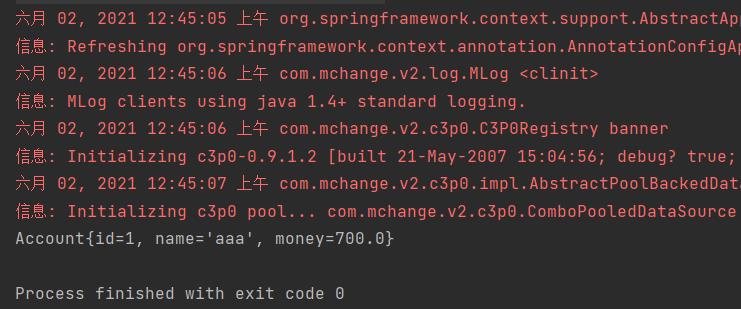Spring 从入门到精通系列 08——使用纯注解的方式实现 IOC 案例与 Junit 整合
Posted Xiu Yan
tags:
篇首语:本文由小常识网(cha138.com)小编为大家整理,主要介绍了Spring 从入门到精通系列 08——使用纯注解的方式实现 IOC 案例与 Junit 整合相关的知识,希望对你有一定的参考价值。
本文针对Spring使用纯注解开发,并对 Spring 整合 Junit 做了一定的分析。

文章目录
一、 spring中的新注解
1.1 Configuration
-
作用: 指定当前类是一个配置类
-
细节: 当配置类作为 AnnotationConfigApplicationContext 对象创建的参数时,该注解可以不写。
//SpringConfiguration是配置类的类名 ApplicationContext ac = new AnnotationConfigApplicationContext(SpringConfiguration.class);
1.2 ComponentScan
- 作用: 用于通过注解指定spring在创建容器时要扫描的包
- 属性:
- value:它和 basePackage的作用是一样的,都是用于指定创建容器是要扫描的包。我们使用此注解就等同于在xml中配置:
<context:component-scan base-package="com.itheima"></context:component-scan>
- value:它和 basePackage的作用是一样的,都是用于指定创建容器是要扫描的包。我们使用此注解就等同于在xml中配置:
1.3 Bean
- 作用: 用于把当前方法的返回值作为bean对象存入spring的ioc容器中。
- 属性:
- name:用于指定bean的id。当不写时,默认值时当前方法的名称。
- 细节:
当我们使用注解配置方法时,如果方法有参数,spring框架会去容器中查找有没有可用的bean对象
查找的方式和 Autowired注解的作用是一样的
通过以上三个注解,我们就可实现完全脱离 bean.xml 的方式。新建配置类,代码如下:
@Configuration
@ComponentScan(basePackages = "com.itheima")
public class SpringConfiguration {
@Bean(name = "runner")
public QueryRunner createQueryRunner(DataSource dataSource){
return new QueryRunner(dataSource);
}
@Bean(name="dataSource")
public DataSource createDataSource1(){
try{
ComboPooledDataSource ds = new ComboPooledDataSource();
ds.setDriverClass("com.mysql.jdbc.Driver");
ds.setJdbcUrl("jdbc:mysql://localhost:3306/springdb");
ds.setUser("root");
ds.setPassword("000000");
return ds;
}catch (Exception e){
throw new RuntimeException(e);
}
}
}
测试方法:
@Test
public void testQueryRunner(){
//获取容器
ApplicationContext ac = new AnnotationConfigApplicationContext(SpringConfiguration.class);
//获取service层对象
IAccountService accountService = (IAccountService) ac.getBean("accountService");
//执行查询方法
Account account = accountService.findAccountById(1);
System.out.println(account);
}
测试结果:

1.4 Import
-
作用: 用于导入其他配置类
-
属性:用于指定其他配置类下的字节码。当我们使用import注解之后,有import注解的类就是父配置类,而导入的就是子配置类。
在SpringConfiguration.java下
@Configuration @ComponentScan(basePackages = "com.itheima") @Import(JdbcConfig.class) public class SpringConfiguration {...}在新创建的类,用于存放配置信息jdbcConfig.java下
@Configuration //可加可不加 public class JdbcConfig {...配置信息...}在test类下创建容器
ApplicationContext ac = new AnnotationConfigApplicationContext(SpringConfiguration.class);
1.5 PropertySource
-
作用: 用于指定 properties 文件的位置。
-
属性:
- value:指定文件的名称和路径
关键字:classpath,表示类路径下
(这里我们举例,jdbcConfig.properties 在 resources 文件夹下)
jdbcConfig.properties:
jdbc2.driver=com.mysql.jdbc.Driver jdbc2.url=jdbc:mysql://localhost:3306/springdb jdbc2.username=root jdbc2.password=000000父配置类:
@Configuration @ComponentScan(basePackages = "com.itheima") @Import(JdbcConfig.class) @PropertySource("classpath:jdbcConfig.properties") public class SpringConfiguration { }子配置类:
/** * 用于与数据库做交互的配置类 */ @Configuration public class JdbcConfig { @Value("${jdbc.driver}") private String driver; @Value("${jdbc.url}") private String url; @Value("${jdbc.username}") private String username; @Value("${jdbc.password}") private String password; /** * 用于创建一个QueryRunner对象 * @param dataSource * @return */ @Bean(name = "runner") @Scope("prototype") public QueryRunner createQueryRunner(DataSource dataSource){ return new QueryRunner(dataSource); } /** * 创建数据源对象 * @return */ @Bean(name="dataSource") public DataSource createDataSource1(){ try{ ComboPooledDataSource ds = new ComboPooledDataSource(); ds.setDriverClass(driver); ds.setJdbcUrl(url); ds.setUser(username); ds.setPassword(password); return ds; }catch (Exception e){ throw new RuntimeException(e); } } } - value:指定文件的名称和路径
-
细节: 当配置类需要配置多个数据库的时候,有以下两种解决方案。
-
QueryRunner的参数可以根据变量名称,如:ds2来指定注入的数据库配置源信息
@Bean(name = "runner") @Scope("prototype") public QueryRunner createQueryRunner(DataSource ds2){ //ds2表示指定创建 @Bean(name="ds2")的数据库源对象 return new QueryRunner(ds2); } -
用Qualifier注解进行单独配置:他在给类成员注入时不能单独(使用需和Autowired配合),但是在给方法参数注入时可以。
@Bean(name = "runner") @Scope("prototype") public QueryRunner createQueryRunner(@Qualifier("ds2") DataSource dataSource){ return new QueryRunner(dataSource); }@Bean(name="ds2") public DataSource createDataSource2(){ try{ ComboPooledDataSource ds = new ComboPooledDataSource(); ds.setDriverClass(driver); ds.setJdbcUrl("jdbc:mysql://localhost:3306/springdb2(test)"); ds.setUser(username); ds.setPassword(password); return ds; }catch (Exception e){ throw new RuntimeException(e); } }
-
二、Spring 整合 Junit (了解)
Spring 整合 Junit,只在测试工程师方面起到作用,更加关注功能的实现,而不会关注是否创建 ioc 容器。
2.1 问题分析
应用程序的入口 : main方法
junit单元测试中,没有main方法也能执行
- junit集成了main方法
- 该方法就会判断当前测试类中哪些方法有 @Test注解
- junit就让有Test注解的方法执行
junit不会管我们是否采用spring框架
- 在执行测试方法时,junit根本不知道我们是不是使用了spring框架
- 所以也就不会为我们读取配置文件/配置类创建spring核心容器
由以上三点可知 :当测试方法时,没有ioc容器,就算写了Autowired注解,也无法实现注入。那么我们需要解决的是,将原本不能加载 main 方法换掉,换成能加载的,从而实现创建容器。
2.2 Spring 整合 junit配置
-
导入spring整合junit的jar(坐标)
<dependency> <groupId>org.springframework</groupId> <artifactId>spring-test</artifactId> <version>5.0.2.RELEASE</version> </dependency> -
使用junit提供的一个注解把原有的main方法替换了,替换成spring提供的 @Runwith
-
告知Spring的运行器,spring和ioc创建是基于xml还是注解的,并且说明位置 @ContextConfiguration
- localtions: 指定xml文件的位置,加上classpath关键字,表示在类路径下
- classes: 指定注解所在位置
-
当我们使用spring 5.x版本的时候,要求junit的jar必须是4.1.2及以上
如:基于注解配置
@RunWith(SpringJUnit4ClassRunner.class) @ContextConfiguration(classes = SpringConfiguration.class) public class AccountServiceTest { @Autowired private IAccountService as; @Test public void testFindAll(){ //测试查询所有方法 List<Account> accounts = as.findAllAccount(); for(Account account:accounts){ System.out.println(account); } } }如:基于XML配置
@RunWith(SpringJUnit4ClassRunner.class) @ContextConfiguration(locations = "classpath:bean.xml") public class AccountServiceTest { @Autowired private IAccountService as = null; @Test public void testFindAll(){ List<Account> accounts = as.findAllAccount(); for(Account account:accounts){ System.out.println(account); } } }
以上是关于Spring 从入门到精通系列 08——使用纯注解的方式实现 IOC 案例与 Junit 整合的主要内容,如果未能解决你的问题,请参考以下文章